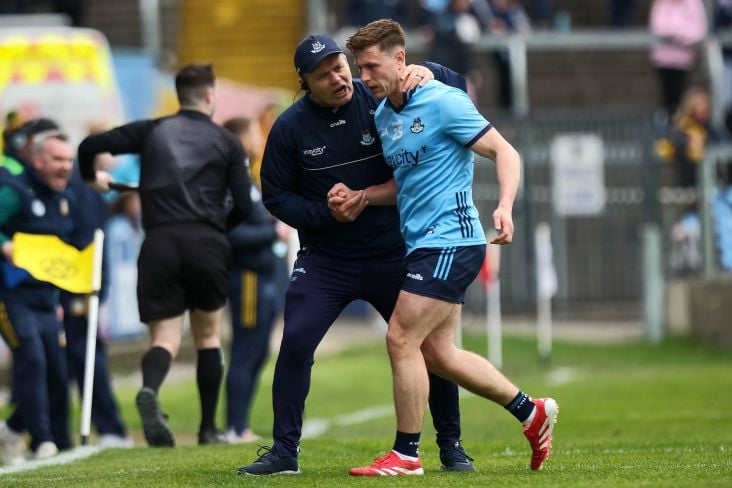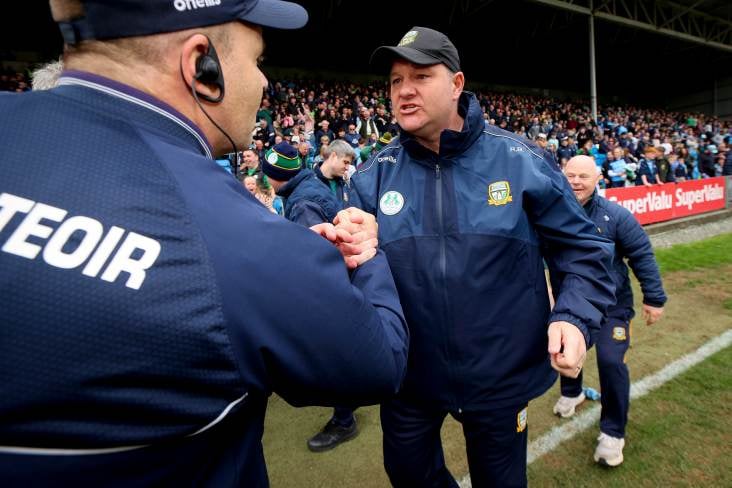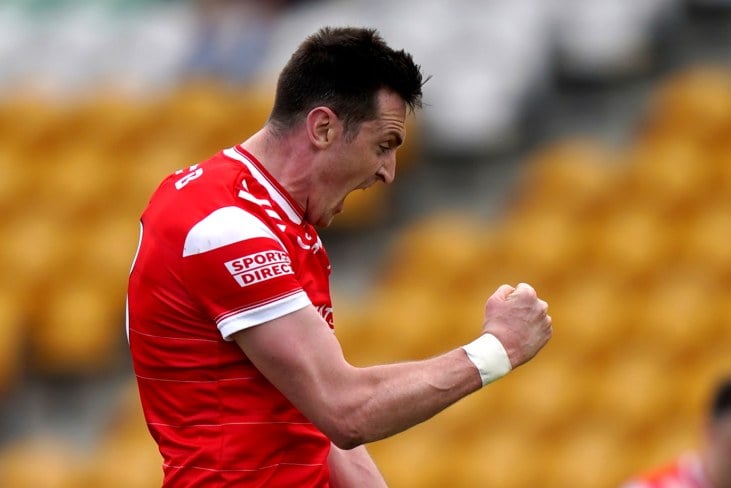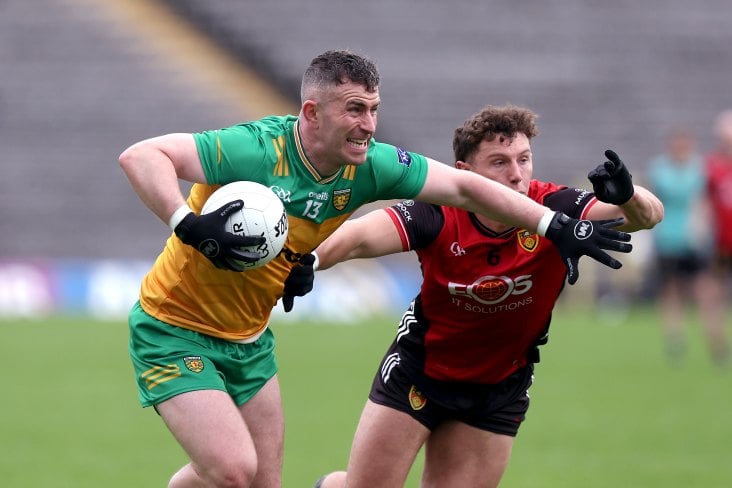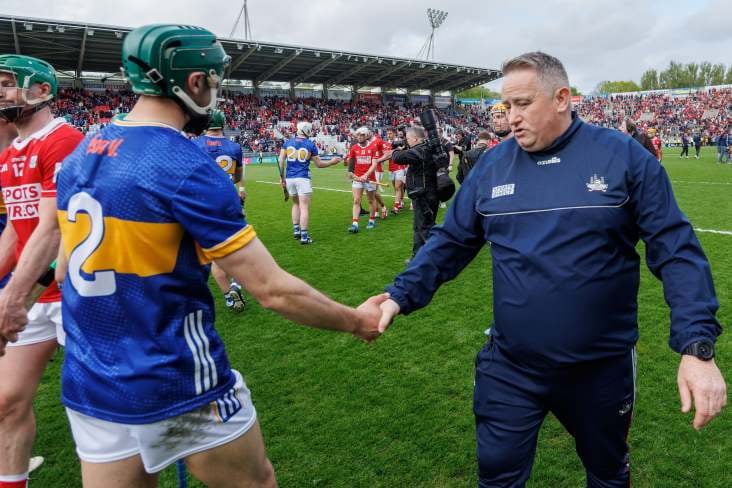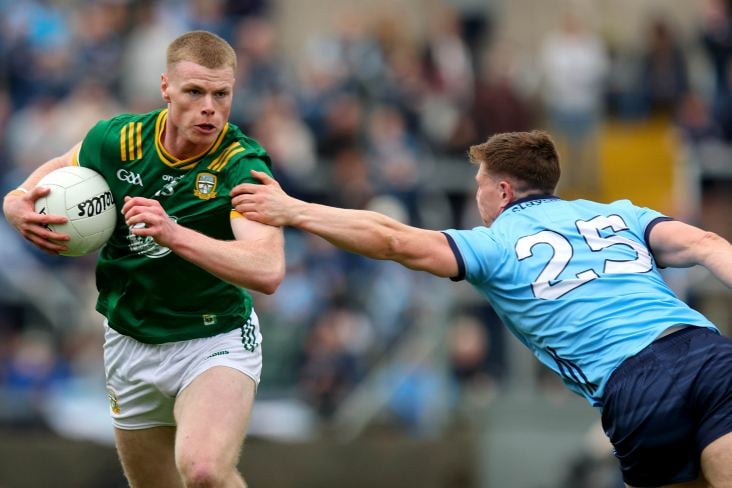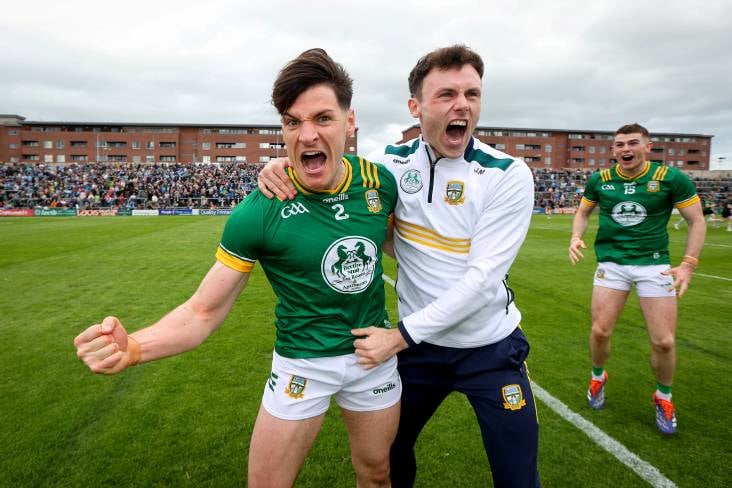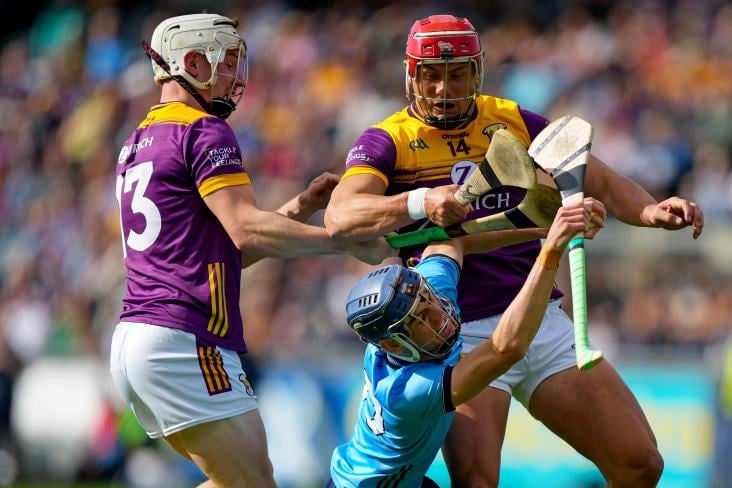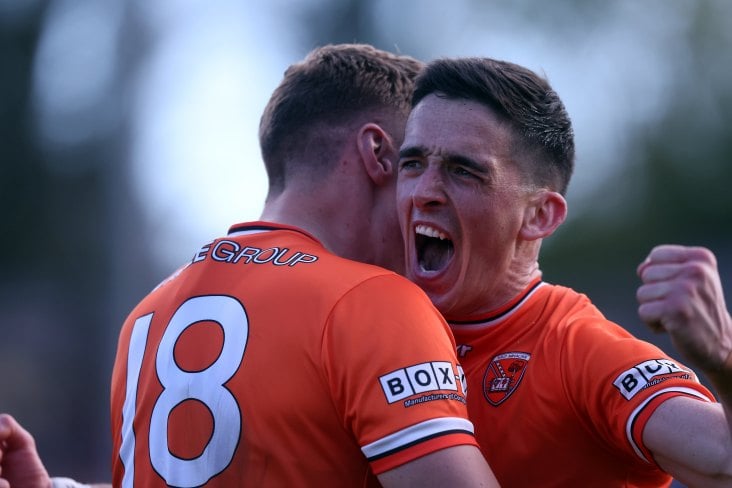The late Joe Murphy
August 06, 2019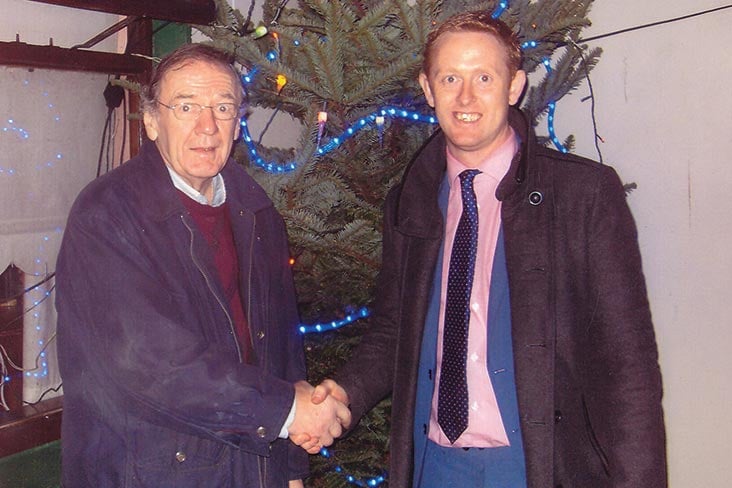
The late Joe Murphy with Kerry's Colm Cooper
We are so sad at having to report the death of Kells football legend Joe Murphy.
Gaeil Colmcille were a dominant force in Meath club football during the mid to late sixties. And at the very heart of this period of supremacy was the sturdy, high fielding, hard hitting midfielder Joe Murphy.
Many felt that he should have been involved with the All-Ireland winning Meath team of 1967. That's another day's story.
But Joe's big chance arrived in 1970 and positioned at full forward he was to play a key role as an unfancied Meath made it all the way to the All-Ireland decider.
He was a star performer in that year's epic Leinster final showdown with emerging Offaly.
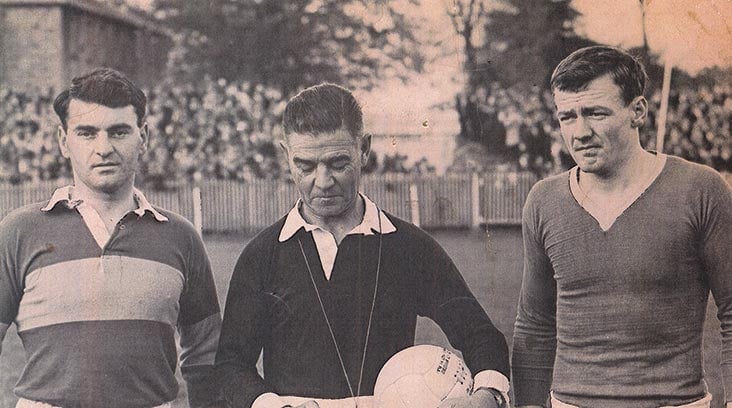
Before the 1964 SFC final against Kilbride. Gaeil Colmcille captain Joe Murphy (right) with referee Tom Mooney and Kilbride's Wardy Sullivan
Joe Murphy encountered some, we will say rather tough, full backs over the course of the campaign. But none mastered the Kells publican and especially when it came to the phtysical stakes.
Besides taking the hits and making room for a pair of under 21 corner forwards, Ken Rennicks and Mickey Fay, he also chipped in with some brilliant boxed points.
Joe Murphy was hugely popular in the north Meath town and its surrounds. He will be badly missed by all and sundry.
Ar dheis De go raibh a anam dilis.
In the 2016 edition of Royal County, the Meath GAA Yearbook,we carried out an interview with Joe. We repeat it below:
No ordinary Joe
It’s the morning of the 1970 All-Ireland SFC final. Pubs all over the county are preparing for a very busy day and an even busier night. In the historic town of Kells, a man is stocking shelves in anticipation of the demand, mindful of the fact that he needs to get to Croke Park for Meath’s eagerly anticipated meeting with Kerry.
A few hours later that same man arrived at the most famous GAA ground in the country, donned the full-forward’s number 14 jersey, played in that game and experienced the disappointment of losing to the Kingdom. That’s life for somebody involved in the pub business and also life for a Gaelic footballer – the necessity to work and the brutal reality of losing the biggest match of the year.
Joe Murphy was only 18 when he played his first game for Meath at senior level. He had spells on and off the panel after that, an undoubted highlight being the 1970 Leinster final when he lined out at full-forward in one of the most amazing games ever played at Croke Park. The Royal County were 11 points behind early in the second half but battled back to lead by three, before being caught by an Offaly goal. They won by one. It was one of those matches which everybody alive at the time appears to have been at, an occasion which anybody who really was among the attendance still recalls with amazement to this day.
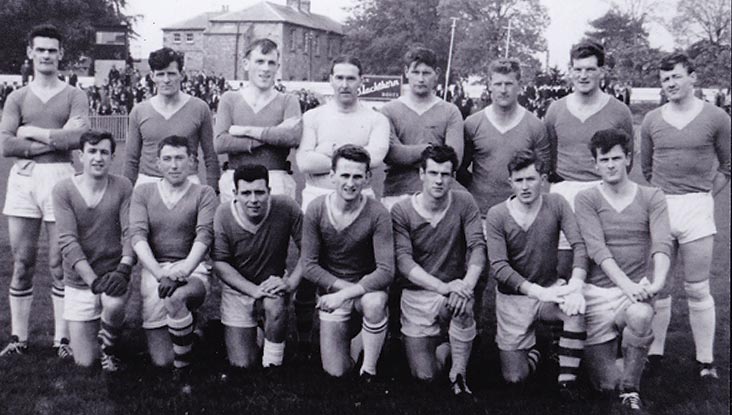
The 1964 Gaeil Colmcille team
“My first game for the Meath seniors was when I was a minor,” Joe recalled. “I played minor and senior in the one year. That was 1961. I was brought in from the minor team along with Red Collier and David Carty. I remember I didn’t know who some of the senior players were. ‘What am I doing here?’ I was asking myself.
“I remember my first game for the Meath seniors. It was against Down in a National League game or a Gaelic Weekly Cup game at Croke Park. I was playing on Paddy Doherty. Down had won the All-Ireland senior title in 1960 and 1961. Paddy was like a film star and here am I playing on him. That was some Down team. They were so stylish.”
Push the clock forward to 1966 and Joe was playing at midfield for Meath.
“I was on and off the Meath panel from 1961 onwards,” he added. “I was more off it than on it if the truth be told. I wasn’t on the panel which reached the All-Ireland final in 1966 but I played the whole of the 1966/’67 National League campaign at midfield with Peter Moore. We got to the semi-final. They took me off in a game against Louth. I was dropped off the panel after that and Meath won the All-Ireland in 1967. It didn’t really bother me at the time but looking back on it now you would be thinking that you don’t have an All-Ireland medal.”
The great Peter Darby of Trim had the honour of captaining that team which brought the Sam Maguire Cup to the county for the third time. Even though Gaeil Colmcille were the reigning county senior champions at that time they didn’t have any players involved. “Gaeil Colmcille were senior champions at the time,” Joe said. “If one of us had been on the panel we would have been captain. Kilbride, the team we beat in the 1966 final after three games, had six players on the panel, yet we had none.”
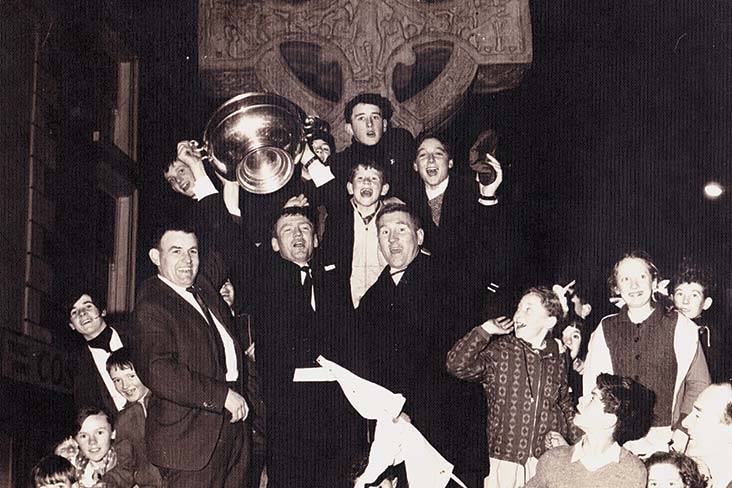
Joe Murphy raises the Keegan Cup as it is brought to Kells in 1966
But Joe did get the opportunity to play in an All-Ireland final a few years later, though it did end in the disappointment of losing to a Kerry team which included players of the calibre of Tom Prendergast, an emerging John O’Keeffe, Mick O’Connell and Mick O’Dwyer, to name but a few.
“Micheal Campbell was appointed as Meath manager at the end of 1969,” Joe added. “I remember I was working behind the bar in the pub in Kells and Benny Caffrey came in and said ‘you’re back on the panel Joe’. My reply was ‘no way am I going back on any panel’ but Micheal asked me to join the panel and I went along with it.
“We got to the 1970 Leinster final against Offaly. That was an amazing game. We went five points ahead early on but Offaly got in for four goals in the first half. Every time we got a point or two they went up and scored a goal. We were 10 points behind at half time and fell 11 behind early in the second half.
“Ollie Shanley was moved back to mark Tony McTeague who had been causing us a lot of problem and Mick White was moved back to the corner where he was better suited. Mickey Fay was brought on and he scored two goals. Those scores revived us. Tony Brennan got the winning point. It was a great comeback. That was an extraordinary game.”
And the full forward from Kells played a huge part in many of the Meath scores. Opposing him was Offaly full back John Smith, reputed to be the hardest man then playing Gaelic football. But within a matter of minutes Joe had Smith on his backside and went on to get the better of their physical confrontation. His presence around the square gave the young Fay room to score his goals Joe Murphy notched two points himself and was heavily involved in many of Meaths other 20 white flags. Final score, Meath 2-22, Offaly 5-12.
“We beat Galway in the All-Ireland semi-final. A lot of Galway’s great players who had won so much in the 1960s, three All-Irelands in a row, were gone at that stage. I was playing on Noel Colleran in that game. I remember I had to work in the pub the night before the final. You’re better off being busy on the eve of a game but you’re being asked a lot of questions about the game. That’s the only problem
“I went to 9.30 Mass on the Sunday morning of the final. Then I went and stocked the pub. I remember walking up from Mass and being wished well by so many people. People were saying ‘good luck Joe’. Benny Caffrey was our driver. He called for me and I went up to Dublin and played a game of football. It was just like any other weekend for me really.
“Kerry scored a couple of goals which they shouldn’t have got and they beat us by seven points. That was the first 80 minute final. Losing it didn’t really get to me at the time but it might get to me sometimes now when I start thinking about it, the realisation that I don’t have an All-Ireland medal. But when it’s over, it’s over. I played my last game for Meath in a tournament in 1971. I was at centre-back.”
Joe won SFC medals with Gaeil Colmcille in 1966 and 1968 and their rivalry with the great Kilbride team of that era is still talked about with much fondness to this day. It included the 1966 final which took three games to decide.
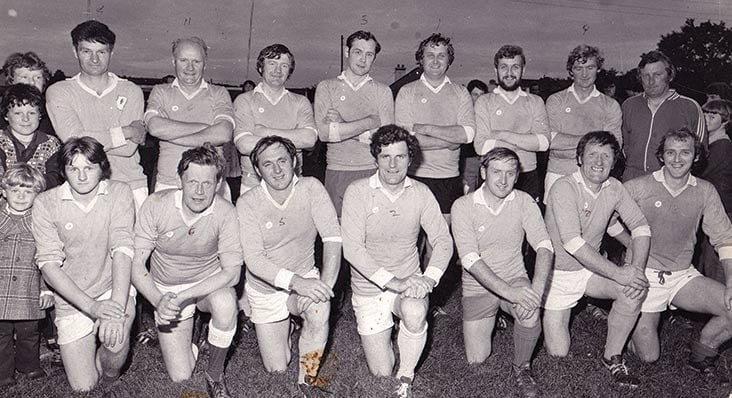
A Jimmy Magee All Star selection with Joe Murphy, back row third from left, on board
“We lost the 1964 senior final to Kilbride,” Joe added. “I was captain that year. They beat us in a semi-final in 1965 but we came back and won it in 1966. We beat Kilbride in the final. It went to three games. I remember Jack Quinn saying to me about 10 minutes from the end of the third game ‘I think you have it Joe’ and he was right. The 1966 final was a bit like the Meath and Dublin saga in 1991. It got big as it developed.
“That was a great Kilbride team. They were essentially made up of three or four families. They were the best club team I ever played against. They were tough but when it was over it was over.
“We won the senior title again in 1968. We beat Walterstown in the final which was played in the spring of 1969. We had to play three games against Skryne in the semi-final that year. That Gaeil Colmcille team had players from various counties, some very good players, but we would have won nothing without Des Ferguson. His word was final. He was made of steel. You couldn’t meet a sounder man.”
When his playing days ended Joe went on to manage several teams and even lined out with neighbours Drumbaragh for a spell during the mid-seventies. “I probably managed about a dozen teams in the Kells area over the years and St Paul’s in Clonmellon,” he said. “But something that gave me great satisfaction was my involvement with a group of youngsters I got together in Rockfield many years ago. I called them ‘The team that Joe built’. It was in the 1980s when Meath were going well.
“They developed into a fabulous team for Gaeil Colmcille. They won everything from under-12 up in both football and hurling. It started from under-12 level in 1988. They won double after double. I got real joy from seeing that. It was great”
Joe's own son Paul was a vital part of this fine side and excelled in the full forward line as Round Towers won the minor championship in 1994 and the Gaeils an under 21 title two years later.
As Joe looks back on his playing days with Gaeil Colmcille and Meath and the way the game of football was played then he rightly feels that it was a lot in his day, a lot more entertaining. The great art of high fielding is sadly missing to a large extent today, a skill so often perfected by the magnificent Kerry player Mick O’Connell.
“The game has changed so much from when I was playing it,” Joe added. “I would love to see Mick O’Connell playing now, pulling balls out of the clouds. He was a great footballer. But the reality is that the way football is being played today they would find a way around him. He would be bypassed at midfield.”
An All-Ireland medal may have eluded Joe Murphy but talking to him now it’s clear that he got a great deal of enjoyment from his playing days.
Tweet